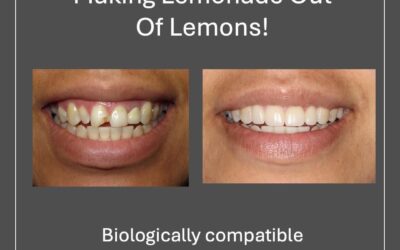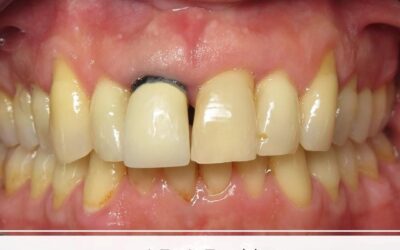Holistic Dentistry: The Dental Industry’s Best-Kept Secret

We’re all afraid of something. For some people, it’s heights, the dark, or small spaces. And for some, it’s going to the dentist. Dental phobia is a common one too: 5-10% of US adults suffer from it. And as many as 20% avoid going to the dentist out of fear or anxiety.
In this post, I’ll go through the symptoms of dental phobia, common causes, and techniques for dealing with it, so you can get the beautiful, healthy smile you desire.
Here’s how to overcome your dental phobia step by step.
1. Know the Signs
Dental phobia is mild for some people and crippling for others. Either way, your fears are real, and you should not feel guilty or embarrassed.
Also, dental phobia can be hard to diagnose in children. If your child often gets upset at the dentist, they might have dental phobia.

Photo: Brian
Here are some common signs and symptoms:
- • Making excuses to avoid going to the dentist
- • Trouble sleeping before an appointment
- • Feeling panicky in the reception area
- • Feeling physically ill at the thought of getting dental work
- • Feeling like you can’t breathe when getting dental work
Do any of those sound like you or your child? Keep reading.
2. Identify the Cause
People develop dental phobia for all kinds of reasons. Prior traumatic dental or medical experiences are common causes. People who have been physically or emotionally abused may also feel vulnerable or threatened in dentists offices.
Some people have a fear of needles, the loss of personal space, or pain in general. Others are terrified of being in a situation where they feel trapped or don’t have control.
It might be hard, but try to identify the root cause of your fear. Many people swear by this technique: Write down your worst fear. Doing this brings your phobia out of your head and onto the paper, where you can look at it more objectively and it becomes more manageable.

“But if I’m too afraid to go to the dentist,” you say, “how can I ever overcome dental phobia?” It’s a tough one, but here are some ideas:
3. Choose the Right Dentist
You want a dentist who understands your fears, not someone who rushes you or makes you feel like a burden. You’re not.
The right dentist will work with you to make sure you feel safe at all times. That includes letting you visit the office before scheduling any dental work. That way you can scope out the environment without even sitting in the chair on your first visit.

At Blodgett Dental, we understand how debilitating dental phobia can be. We do everything we can to give you the dental care you need with maximum comfort and peace of mind. That’s why, when you come to our office, you step into a soothing and welcoming spa-like atmosphere, not a scary medical building.
4. Communicate With Your Dentist
Once you’ve found the right dentist, have a chat with him or her about what scares you. Try to be as honest and specific as you can.
Talking about a phobia can be hard, especially when you’re already feeling vulnerable. But many people actually say voicing their fears aloud is empowering.

We will never judge you — we just want to know as much as we can so we can come up with the best strategy for you.
5. Bring Moral Support
Have a friend or family member you trust come with you. You’ll feel more supported and their calm attitude might even relax you.
Try this: Come up with a signal (like raising your left arm) to tell the dentist to stop if you feel pain or fear. Make sure both the dentist and your support buddy know the signal.
6. Calm Down Your Body
You’ve done everything right: talked with your dentist, scoped out the office, and brought a friend for support. What do you do if you get to your appointment and still start to panic?
When your stress levels are high, your body goes into “fight or flight” mode. Your heart pounds, you sweat, your muscles tense, and you feel like you can’t breathe.
This happens because our minds and bodies are closely connected. When you’re scared, your body reacts. But the connection works the other way too: calm your body and your mind will start to relax.
So how do you put your body at ease? Here are a few techniques:
Deep breathing:
Slow, deep breaths send a message to your brain that you are safe and relaxed. Here are three breathing exercises to try.
Check in with your body:
Start with your feet and mentally work your way up. Recognize where you’re holding tension. When you find it, relax those muscles by imagining your breath going into them and taking away the tension when you breathe out.
Take some alone time:
It can be hard to relax in a crowded waiting room. Ask if you can use the restroom or another quiet place to take a few deep breaths and calm down.
Have something familiar:
Bring a blanket or your favorite slippers to help you feel cozy and at home.

Photos: Nadia, Judith Doyle, Pexels
Ask about sedation:
Some dentists offer sedation medication to help you stay calm during the appointment. Talk to your dentist about options. At Blodgett Dental Care, we offer numerous sedation approaches from “NuCalm” (a non-drug sedation option) to conscious sedation (taking a pill to relax) to working with an anesthesiologist where you can completely sleep through your procedure.
7. Consider the Idea of Therapy
If those techniques just aren’t working, therapy is probably the next step. A good psychologist or counselor can help you get more comfortable with dental work in a safe environment.
The most common approach is called direct therapeutic exposure. It involves gradually introducing you to the thing you’re afraid, one small dose at a time.
Conclusion
If you’ve been avoiding the dentist, it’s important you see one ASAP — especially if you have dental phobia. The longer you wait, the more damaged your teeth will get, and you’ll need more intensive dental work to fix them. Getting in quickly and following these steps can minimize your discomfort significantly.
We’ll work with you to make sure you feel safe. And we’ll never pressure you into anything. We are here to serve you and help you meet your goals.
Are you ready to finally get beautiful and healthy teeth? Schedule an appointment today!
Read Also
Wellness Wednesday: Making Lemonade Out Of Lemons!
Making Lemonade Out Of Lemons Today’s health recovery story is one of my favorites! From the moment I met this woman I thoroughly enjoyed her spirit. She was determined to regain her total health and wellness and to pursue the smile of her dreams! Like many people she...
Toxic Tuesday: Gangrene Tooth Causing Sinus and Lung Problems
Toxic Tuesday: Gangrene Tooth Causing Sinus and Lung Problems Toxic Tuesday: Gangrene tooth causing sinus and lung problems. Today’s story is about a middle-aged man who injured his front tooth as a child. After the traumatic tooth accident, the nerve died and root...
The Differences Between Biological and Holistic Dentistry
The Differences Between Traditional and Biological Dentistry Wellness Wednesday: The differences between traditional and biological dentistry. One of the questions I am frequently asked is: “How would you describe the difference between traditional and...




